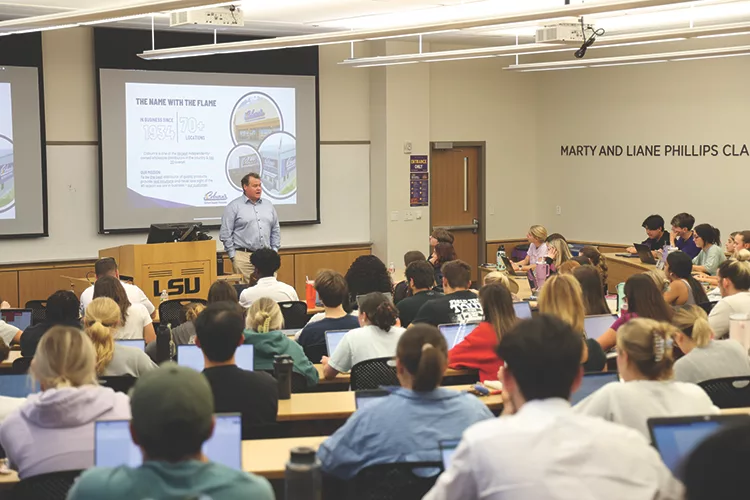How do you go about placing the spotlight on the PHCP industry as a viable career path? For Coburn Supply Co., wholesale distributor of plumbing, HVAC and electrical supplies headquartered in Beaumont, Texas, it found a unique way to spotlight not only the industry, but also its company. And when opportunity meets ambition — magic happens.
Patrick Maloney, president of Coburn Supply Co., is the fourth-generation leader at the helm. With locations spanning Texas, Louisiana, Mississippi, Alabama and Tennessee, finding and retaining talent is essential to not only to run the business, but to also uphold the deep familial culture woven throughout the 90-year-old company.
One way to spread the word, Maloney found, is to connect with local colleges and universities within the communities it serves and speak to supply chain and industrial distribution students.
Inspiration
Maloney frequently speaks about Coburn Supply Co. to schools such as Louisiana State University, Texas Christian University and Texas A&M University, as well as smaller state schools . In speaking to supply chain and industrial distribution students, he talks about the company and its business, and discuss opportunities from warehouse and operations to sales, etc.
“They don’t know the opportunities within distribution,” he says. “So, I can tell them firsthand that’s it’s more than running a supply chain. We sell things! We have showrooms, we have designers, we have inside sales and outside sales, we have marketing,” Maloney smiles . He adds that opening the world of PHCP distribution is his way of connecting with the students and finding out their interests.
When he started out on his school visits, he wasn’t sure what to expect. “When it came time for the Q&A, I thought I was going to hear crickets; instead, I was flooded with questions,” he says. “They’re talking about supply chain, about family-owned business and tariffs. These kids are smart, they are eager to learn — yet they don’t have work experience yet,. It would be a disservice if we did not try to attract them to our industry.”
While speaking at Texas A&M, the students asked about Coburn’s LinkedIn page (which it did not have at the time), and if the company had an internship program. He realized the students were smart and savvy, and would research companies via their LinkedIn pages, as well as other social media.
“I found out that LinkedIn is where they get their information, and while we are on other social media, we didn’t have a LinkedIn page yet,” Maloney notes. Returning to Beaumont, he had the marketing department create Coburn’s LinkedIn page.
The other action item he took back with him was to develop an internship program, something that students wanted. It’s an easy way to get young people into an organization and familiarize them with the industry, as well as with the uniqueness of the company. “Students want experiences,” Maloney says. “Internship programs provide the best way for them to understand the opportunities within a company and the industry as a whole.”
This year, Coburn Supply launches its internship program to attract and develop talent who understands the complexities of the distribution industry, and to position Coburn’s as an employer of choice for motivated young professionals.
Program structure
Coburns knew that for the program to be successful, it needed strong mentors to guide students in all aspects of the business. It looked to its extensive locations network, diving into the communities it serves. “We selected branches with plumbing, HVAC, inside and outside teams, waterworks, electrical, showrooms, etc., and then coordinated with managers who would be good mentors,” he explains. “We look at interns as regular summertime employees, and at the same time, we’re providing more access and visibility because we want them to learn about the business and the industry.”
Around 10 to 15 interns will enter the program, and each is assigned a mentor — typically, it will be a seasoned branch manager or team leader — to ensure they have guidance and support throughout their experience. Mentors play a pivotal role in helping interns connect their classroom knowledge to real-world applications. They are responsible for setting expectations, providing guidance, facilitating learning opportunities and encouraging problem-solving.
“Having a strong mentor is crucial,” Maloney emphasizes. “The mentor acts as a guide, helping interns not only understand the business but also see how their contributions fit into the bigger picture. It’s about making the experience as enriching and impactful as possible.”
The idea is for the program to span 10 weeks, immersing students in the company’s operations. It’s not only about “filing paperwork” in an office — it’s so much more. Interns will spend a month in the warehouse and several weeks in inside sales, quotations, working the warehouse counter, within a showroom and other areas. It’s about showing them that there is more to being in the supply chain than warehouse operations. The experience is capped with visits to Coburn’s distribution centers and corporate office to provide a comprehensive view of the business.
A unique feature of the mentorship program is its capstone projects. “We want interns to have a project; we want them to incorporate their book knowledge into our day to day,” Maloney explains. “At the end of their internship, they present the project’s challenge and a potential solution to senior management. It’s a great way to get new information and perspective, and hopefully we can apply it in our business.”
Impact on the PHCP industry
The program’s long-term goal is to hire a significant percentage of interns as full-time employees. I ask if the program was only available to upper-level students, to which Maloney quickly replies, “If you are an able-bodied freshman or senior, you are eligible. We don’t have a prerequisite. We want anyone who has an interest, along with the book smarts, to apply.”
Success, for Coburn’s, is about more than filling internship spots. “We want to hear directly from participants about what worked and what didn’t,” Maloney says. “And if interns leave with a positive impression of Coburn’s and the distribution industry, that’s a win for us.”
Maloney also highlights the ripple effect the program could have within the industry: “Even if interns don’t join our company, they might enter the industry elsewhere, and that strengthens the entire talent pipeline.” It’s all about shining a spotlight on an appealing industry that has a wide range of career path opportunities. And Coburn’s would know — it’s strong company culture and career path growth within the company is legendary.
In its first year, the program has already garnered interest from a diverse group of students — and the future looks bright for this innovative initiative.






